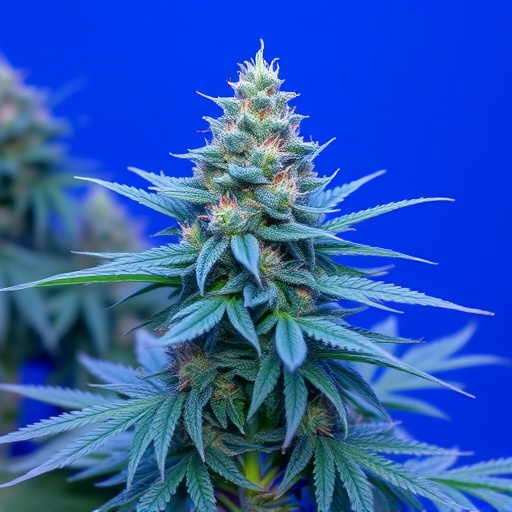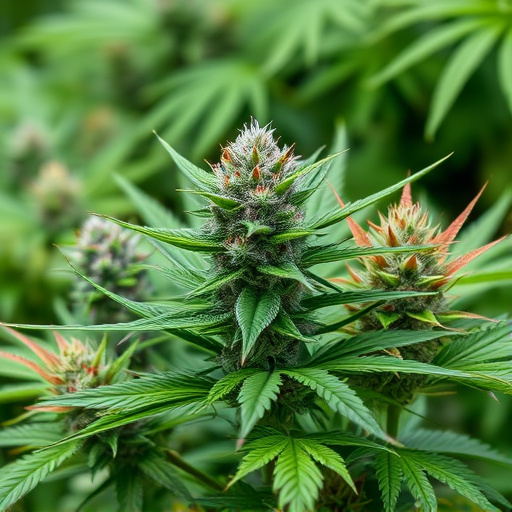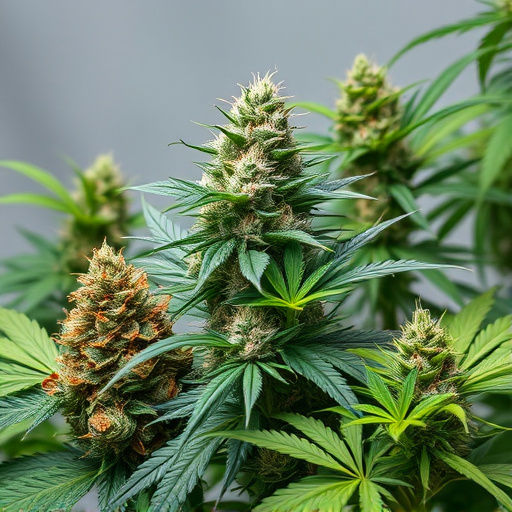Medical cannabis strains, primarily characterized by their high THC content, interact with the body's endocannabinoid system (ECS) to influence mood, memory, appetite, and pain. THC binds to CB1 and CB2 receptors, leading to physiological benefits like anti-inflammation and analgesia, as well as psychoactive effects such as heightened senses and altered perception. While these strains offer relief for conditions like chronic pain and anxiety, long-term use may result in tolerance development, reduced motor coordination, and potential mental health impacts. Careful consideration is crucial, especially for individuals with pre-existing medical conditions or those taking other medications.
“Unraveling the Complexities of High-THC Medical Cannabis Strains: A Comprehensive Guide
This article delves into the multifaceted impact of high-tetrahydrocannabinol (THC) strains on both the body and mind, offering a nuanced understanding for consumers. We explore the physiological effects, from short-term sensations to long-term considerations, including potential risks. Additionally, we dissect its influence on mental health, highlighting impacts on mood disorders and creativity. Furthermore, it guides readers in navigating high-THC strains responsibly, emphasizing strain selection, safe use practices, and individualized approaches for optimal benefits while mitigating risks, all crucial aspects when considering medical cannabis strains.”
- The Physiological Effects of High-THC Strains
- – Understanding THC and its interaction with the endocannabinoid system
- – Short-term vs long-term physiological impacts
The Physiological Effects of High-THC Strains

High-THC medical cannabis strains have profound physiological effects on the body, primarily due to their interaction with the endocannabinoid system (ECS). The ECS is a complex network of receptors and neurotransmitters that modulate various bodily functions, including pain perception, appetite, mood, memory, and inflammation. When THC binds to CB1 receptors in the brain and CB2 receptors in immune cells, it can trigger a cascade of responses. This activation can lead to the release of neurotransmitters like dopamine, which is associated with pleasure and reward, potentially explaining the psychoactive effects users experience.
Moreover, high-THC strains may influence cardiovascular systems, causing mild increases in heart rate and blood pressure. Some users also report heightened sensory perception, including enhanced taste and smell. While these effects can be enjoyable for some, they’re not without potential risks. The physiological impact of high-THC consumption should be carefully considered, especially for individuals with pre-existing medical conditions or those taking other medications.
– Understanding THC and its interaction with the endocannabinoid system

The compound THC (tetrahydrocannabinol) is a key component found in medical cannabis strains, known for its potent effects on both the body and mind. When consumed, THC interacts with the endocannabinoid system (ECS), a complex network of receptors located throughout the body that play a significant role in maintaining homeostasis. The ECS influences various physiological processes, including mood, memory, appetite, and pain perception.
THC’s ability to bind with these receptors, particularly CB1 and CB2, leads to its psychological and physiological effects. Activation of CB1 receptors in the brain is responsible for the psychoactive properties associated with cannabis use, while CB2 receptor interaction in the immune system contributes to potential anti-inflammatory and analgesic effects, making medical cannabis strains valuable for managing certain conditions.
– Short-term vs long-term physiological impacts

High-THC (tetrahydrocannabinol) strains of medical cannabis have both immediate and long-lasting effects on the body and mind, distinct from their short-term physiological impacts to their enduring influence. In the acute phase, users may experience heightened senses, altered time perception, increased heart rate, and a sense of euphoria. These effects are primarily responsible for the recreational appeal of high-THC strains but can also lead to anxiety, paranoia, or disorientation in some individuals, highlighting the strain’s potential for adverse reactions.
Long-term use of high-THC medical cannabis strains presents different considerations. Regular consumption may result in tolerance development, requiring higher doses to achieve the same effects. Additionally, chronic exposure can impact physiological systems over time, affecting appetite, memory, and motor coordination. While some users report positive effects on conditions like chronic pain or anxiety, long-term studies are needed to fully understand these strains’ comprehensive impacts on various aspects of physical and mental health.
High-THC medical cannabis strains significantly impact both the body and mind, offering potential therapeutic benefits while requiring careful consideration. Understanding how THC interacts with the endocannabinoid system is crucial for navigating short-term and long-term effects. While these strains can provide relief for various conditions, their use should be balanced against potential risks to ensure a safe and effective experience. By staying informed about the latest research on medical cannabis strains, individuals can make educated decisions about their health and well-being.














